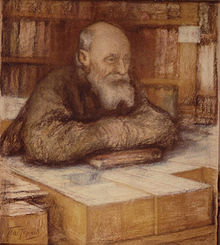Nikolai Fyodorovich Fyodorov
| Nikolai Fyodorov | |
|---|---|

Nikolai Fyodorov by Leonid Pasternak
|
|
| Born | June 9, 1829 Tambov Governorate, Russian Empire |
| Died | December 28, 1903 (aged 74) Moscow, Russian Empire |
| Website | nffedorov |
| Era | 19th-century philosophy |
| Region | Russian philosophy |
| School | Russian Cosmism |
Nikolai Fyodorovich Fyodorov (Russian: Никола́й Фёдорович Фёдоров; surname also Anglicized as "Fedorov") (June 9, 1829 – December 28, 1903) was a Russian Orthodox Christian philosopher, who was part of the Russian cosmism movement and a precursor of transhumanism. Fyodorov advocated radical life extension, physical immortality and even resurrection of the dead, using scientific methods.
Fyodorov's parents were the Rurikid knyaz (noble) Pavel Ivanovich Gagarin and Elisaveta Ivanova, a woman of lower-class nobility.
He studied at the Richelieu Lyceum in Odessa. From 1854 to 1868, he served as a teacher in various small Russian towns. During 1878, he joined the Rumyantsev Museum staff as a librarian. Fyodorov opposed the idea of property of books and ideas and never published anything during his lifetime. His selected articles were printed posthumously with the title Philosophy of the Common Task (also known as Philosophy of Physical Resurrection).
Fyodorov was a futurist, who theorized about the eventual perfection of the human race and society (i.e., utopia), including radical ideas like immortality, revival of the dead, space and ocean colonization. His writings greatly influenced mystic Peter Uspensky. He also had direct contact with early rocket theorist Konstantin Tsiolkovsky, who visited the library where he worked over a 3-year period. He was also known to Tolstoy and Fyodor Dostoyevsky.
...
Wikipedia
